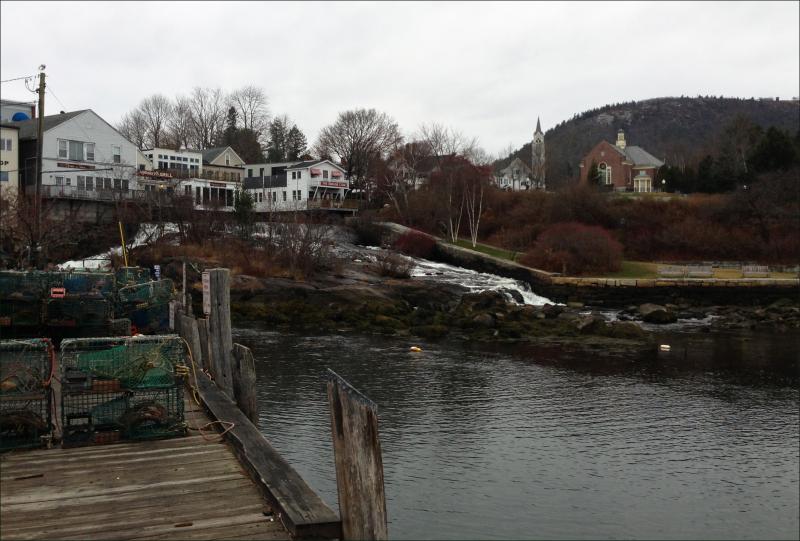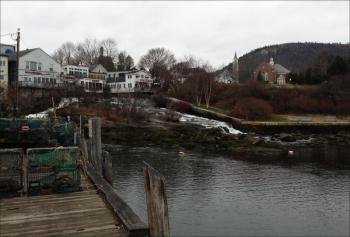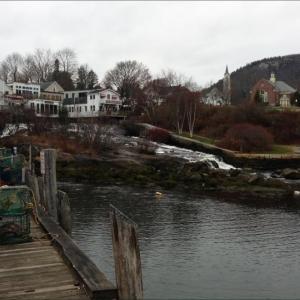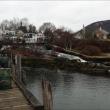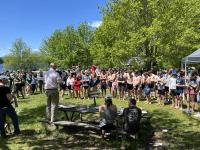Maine Dept. of Agriculture grants Camden $40,000 to help redesign dam, Harbor Park seawall
The Municipal Planning Assistance Program, a division of Department of Agriculture Conservation and Forestry's Bureau of Resource Information and Land Use Planning, said Sept. 24 that Camden and Monhegan Island are among four communities receiving grants for project design work.
Camden: Camden Harbor Park Seawall and Montgomery Dam Redesign ($40,000)
Project Description: Funds will help Camden complete engineering and design plans for the partial or full removal of the Montgomery Dam and the reconfiguration of the seawall and adjacent area in Camden’s Harbor Park.
The project will result in a final design for modifications to the Montgomery Dam and reconfiguration of the adjacent seawall and adjacent area in Harbor Park to improve coastal and inland flood resilience and the passage of fish and other species from Camden Harbor up the Megunticook River.
“Overall this project is an essential step in addressing more frequent storm surge events and improving the health of the entire watershed,” according to a news release from the Municipal Planning Assistance Program.
Project Partners: Island Institute, Megunticook Watershed Association, Coastal Mountains Land Trust, The Nature Conservancy, George’s River Chapter of Trout Unlimited
Monhegan Plantation: Alternative water supply feasibility study ($39,240)
Project Description: Monhegan and the Monhegan Water Company will conduct a risk assessment of their sole source fresh water aquifer in light of recent studies predicting flood hazard scenarios related to sea level rise and increased storm surge.
The Study will examine current groundwater fed bedrock wells to gauge vulnerability to saltwater intrusion and evaluate the feasibility of drilled bedrock wells as a safer and more reliable alternative public water source for residents of Monhegan.
Project Partners: Island Institute, Lincoln County Regional Planning Commission, Monhegan Water Company
Bustins Island Village Corporation: Green Infrastructure Design ($17,802)
Project Description: Funds will support further analysis of upland hydrology and stormwater run-off which aggravates bluff erosion to inform detailed, actionable designs for green infrastructure to slow and retain upland rainfall. The goal of the project is to design adaptive green infrastructure to replenish the island's aquifer, restore native habitat, reduce stormwater run-off. "Living shoreline" bluff protection and repair will be examined in addition to other alternative designs.
Project Partner: Cumberland County Soil and Water Conservation District
Southern Maine Planning and Development Commission : Tides, Taxes and New Tactics ($46,187)
Project Description: Working closely with the municipalities of York, Kennebunk and Wells, the project team will investigate municipal-level economic and social impacts of sea level rise and storm surge hazards and develop locally-relevant adaptation and resiliency planning strategies that address local and regional vulnerabilities.
The project team and advisory committee will use recently updated and downscaled sea level rise projections, storm surge modeling, and local tax and property data, to conduct a GIS-based economic vulnerability assessment of flood hazard impacts to coastal private property, evaluate associated implications for the municipal tax base, and research, evaluate, and implement locally relevant, creative adaptation strategies to help towns and the region prepare for sea level rise.
Project Partners: Towns of York, Kennebunk and Wells, Wells National Estuarine Research Reserve, Maine SeaGrant, Island Institute
About Coastal Community Grants
Coastal Community Grants are an important element of the Municipal Planning Assistance Program’s mission of fostering innovative and effective approaches to land use management by providing technical and financial assistance to Maine municipalities. This was the tenth round of grants, which since 2012 have provided $1.87 million for 69 projects throughout coastal Maine.
At the conclusion of each project, grant recipients prepare a case study to describe the project’s approach and results, identify next steps and needs, share lessons learned and applicability for other municipalities and help identify municipal and regional needs and emerging coastal issues. The case studies focus on sharing lessons learned “in their own words” on the webpage: https://www.maine.gov/dacf/municipalplanning/casestudies/ccg-case-studies.shtml.
Event Date
Address
United States

